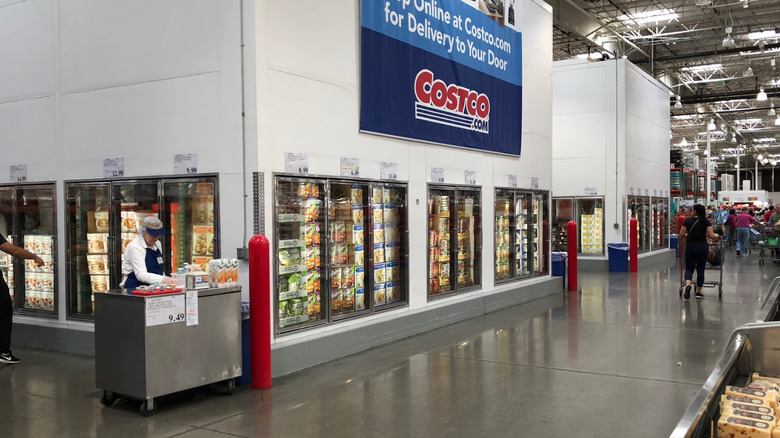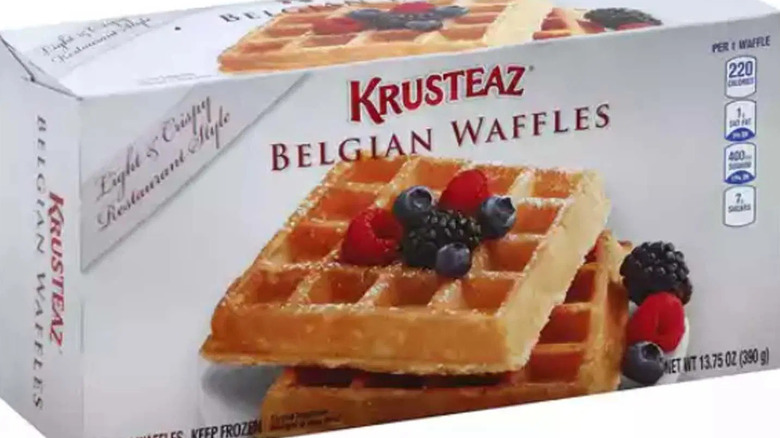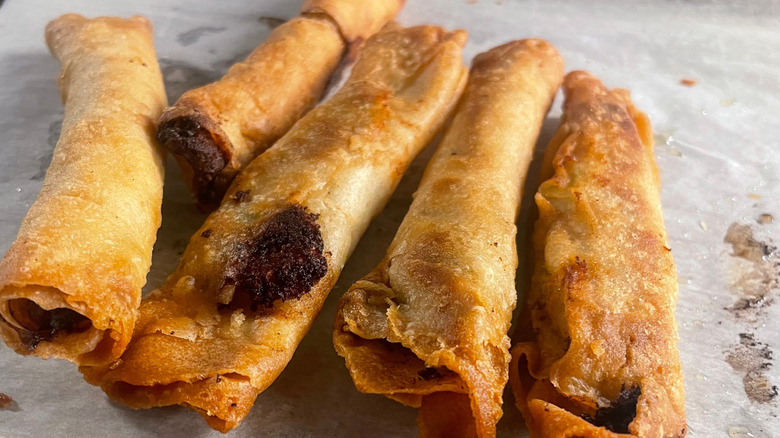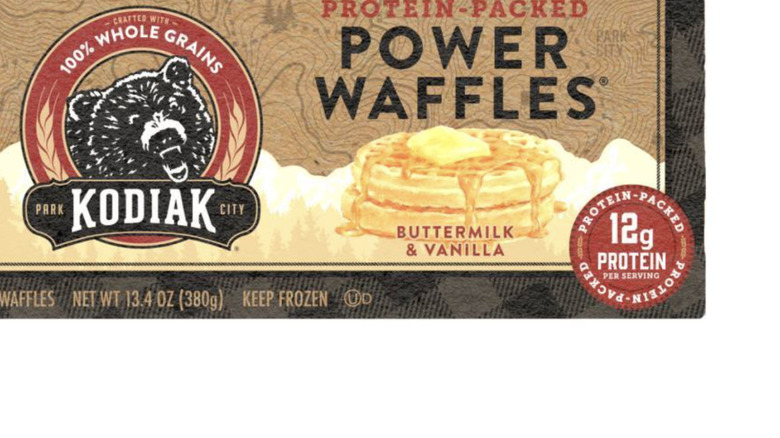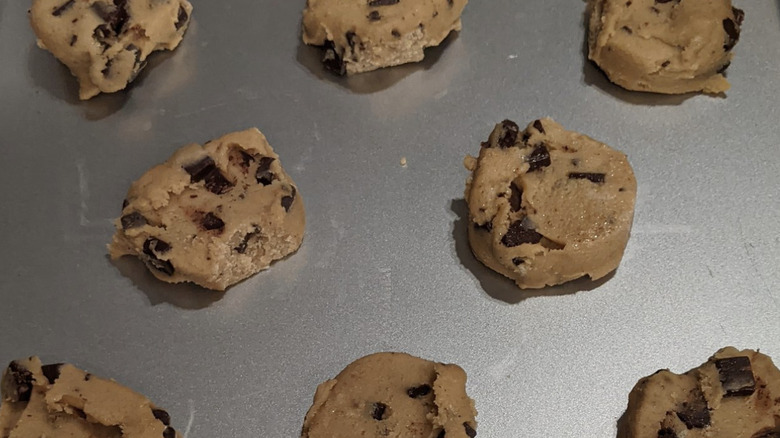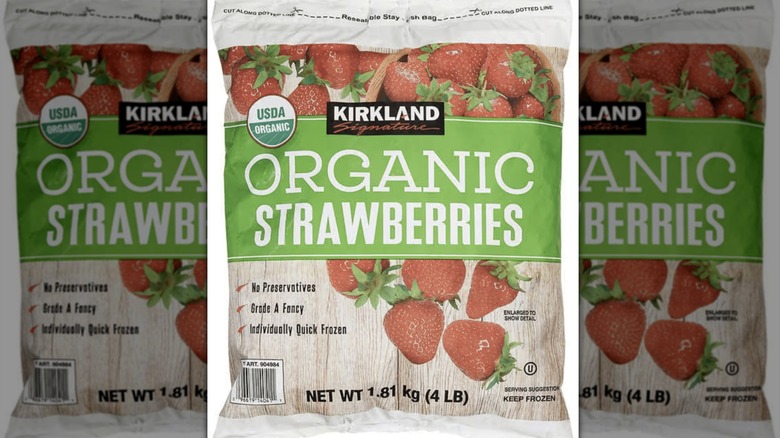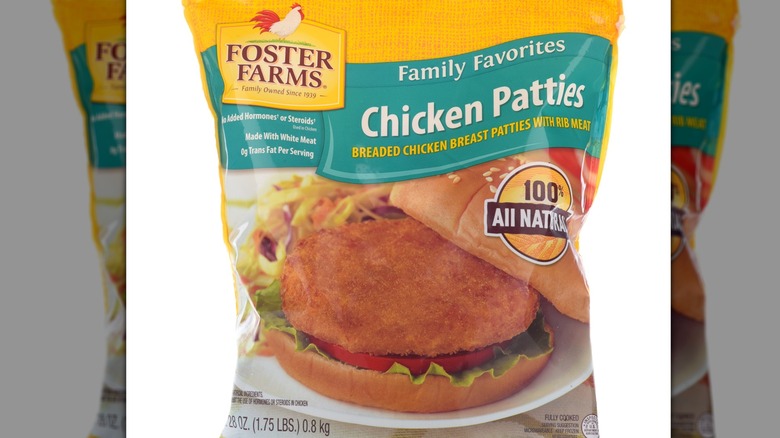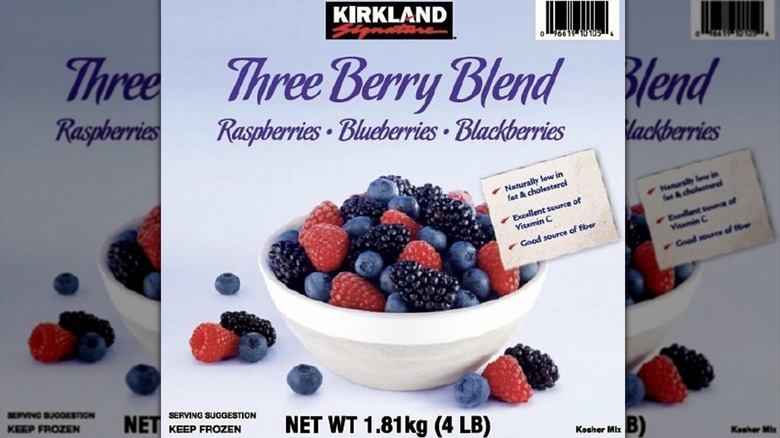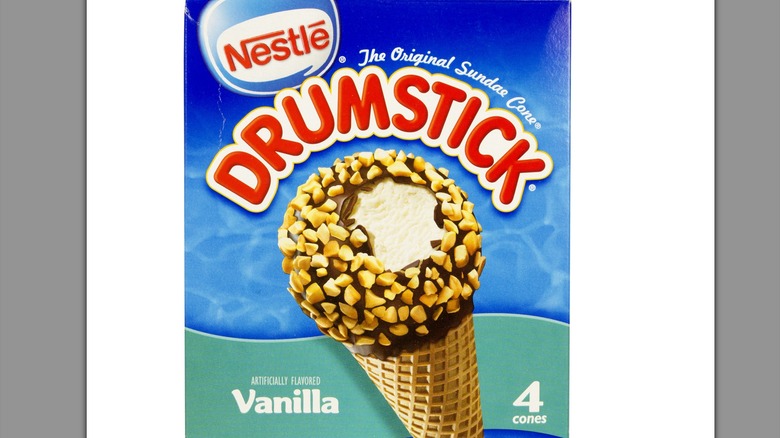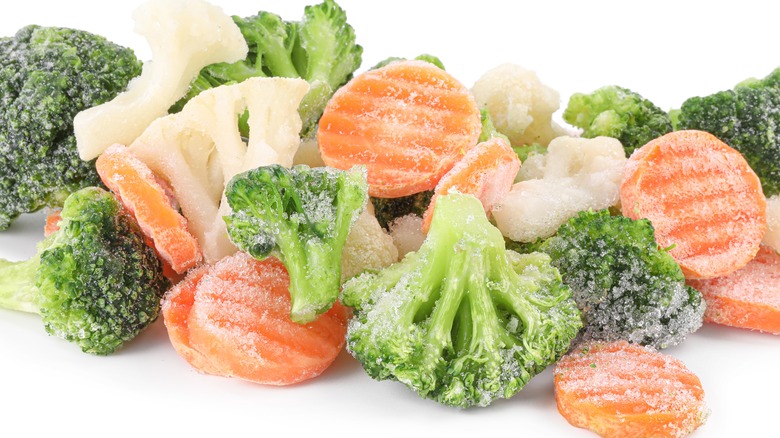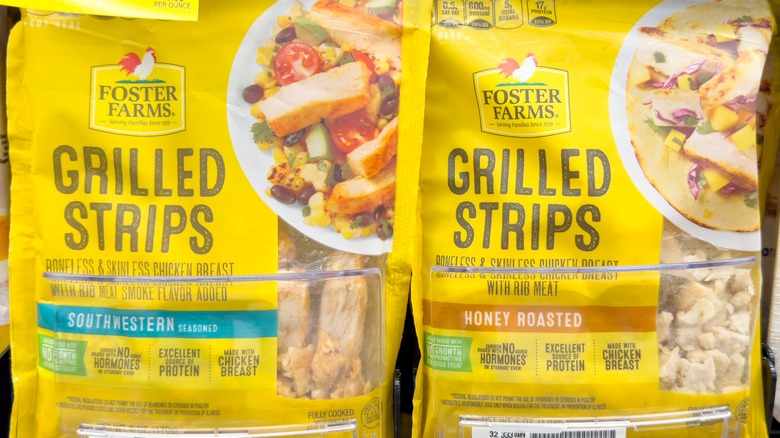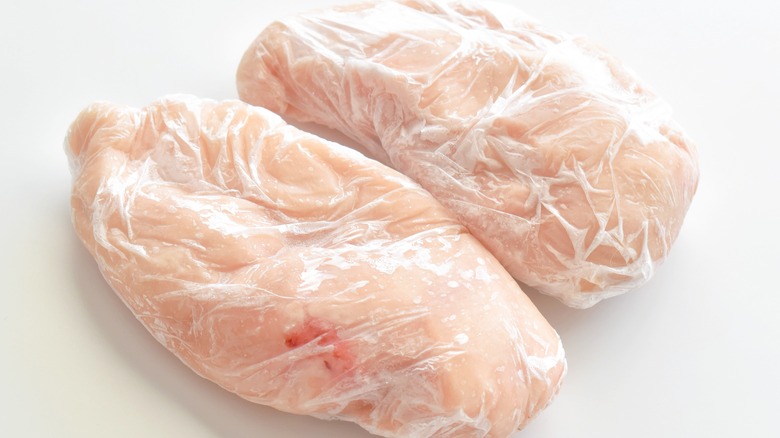12 Frozen Food Recalls That Plagued Costco
Costco's abundant frozen food section has seen more food recalls than the bulk grocery chain would like to admit. In order to stock family-sized portions of frozen goods in its more than 600 stores nationwide, warehouse retail giant Costco relies on distributors that manufacture food on a massive scale. When food recalls plague these giant manufacturing plants, huge quantities of food are pulled from store freezers and destroyed. Costco's food recalls don't just hurt sales and reputation, they make shopping at the chain potentially dangerous.
Food recalls are necessary to keep unsafe products from being eaten by consumers. The presence of foodborne bacteria (which causes food poisoning) or a foreign object (such as plastic, metal, or glass) are two major reasons why products are pulled from shelves. Product mislabeling is another big recall trigger, especially when an undeclared allergen isn't listed on the food's packaging. The Food and Drug Administration (FDA) and United States Department of Agriculture (USDA) oversee all national food recalls. Simultaneously, it's Costco's responsibility to ensure that the foods it sells won't hurt or kill anyone.
That's right, kill. According to data from the U.S. Centers for Disease Control and Prevention (CDC), an estimated 128,000 hospitalizations and 3,000 deaths occur each year due to foodborne illness. Costco has tried to avoid contributing to this statistic, but has not been successful. Costco's frozen foods are part of the problem. These are some of the frozen food recalls that have sent chills down Costco's proverbial spine.
Krusteaz frozen Belgian waffles in 2024
The convenience of frozen waffles got complicated all of a sudden when Costco removed Krusteaz frozen Belgian waffles from stores in October 2024. Krusteaz's parent company TreeHouse Foods issued the recall when Listeria monocytogenes were discovered at one of its production facilities. According to TreeHouse, the listeria contamination was found at its Brantford, Ontario plant and was discovered through routine in-house testing.
The initial recall for frozen waffles was announced on October 18, 2024. The list of recalled items was substantial, but Krusteaz Belgian waffles were spared from it. That changed once the recall was expanded days later. The expansion grew to include frozen pancakes and more frozen waffles. TreeHouse Foods makes almost every frozen pancake and waffle brand you've ever heard of. Not Eggo frozen waffles, though. Fortunately, Costco's waffle-loving shoppers still had Eggo.
The FDA has not disclosed how many pounds of recalled product were amassed from the TreeHouse Foods recall, but judging by how many brands and product varieties were affected, it was definitely a lot. On the upside, as of late November 2024, no illnesses or deaths have been linked to this recall. Consumers who are in possession of Krusteaz Belgian waffles or any of the recalled waffle or pancake brands in their freezers are urged to return them to the place of purchase for a credit.
El Monterey frozen chicken taquitos in 2024
A humongous Boar's Head deli meat recall shook the food industry in the summer of 2024, becoming one of the deadliest food recalls of all time. Come fall, BrucePacs became the next meat manufacturer to grapple with a recall of terrifying proportions — and this time Costco's supply was affected. As of November 2024, BrucePac has recalled nearly 12 million pounds of chicken products due to a listeria contamination at its plant in Durant, Oklahoma. The frozen items pulled from Costco's shelves are El Monterey Mexican Grill Chicken & Cheese Taquitos and various chicken burritos made by Red's All Natural.
The chicken in El Monterey frozen taquitos and Red's All Natural frozen burritos are manufactured by BrucePac, and the affected products were sold at Costco between July and October 2024. The Red's All Natural burritos included in the recall are Southwestern Grilled Chicken Mini Burritos, Grilled Chicken & Cheddar Burritos, and Chicken Chorizo Breakfast Burritos. Unlike the disaster at Boar's Head, no one has died (yet) from the BrucePac chicken recall, but it's still a disaster.
BrucePac voluntarily recalled 9,986,245 pounds of ready-to-eat chicken products potentially compromised by Listeria monocytogenes on October 9, 2024. The Class I recall was expanded on October 15, bringing the total quantity to 11,765,285 pounds. In addition to the scroll of frozen and fresh chicken products recalled from the retail market, BrucePac's tainted chicken was also distributed in school cafeterias.
Kodiak Power Waffles in 2024
The year 2024 isn't over yet, but it's already been a bad one for frozen waffle recalls. Before mega breakfast brand Kodiak found itself looped into TreeHouse Foods' colossal October 2024 regarding listeria concerns, its Protein-Packed Buttermilk & Vanilla Waffles were recalled on August 26, 2024. The Class II recall was due to the presence of a foreign contaminant. The material inside the frozen waffles that shouldn't have been there was soft plastic film.
Kodiak promptly recalled 7,300 boxes of 40-count Protein-Packed Buttermilk & Vanilla Waffles, amounting to 24,455 pounds of product. The Costco locations affected in the recall were in the Midwest. Stores in Illinois, Indiana, Iowa, Kansas, Kentucky, Michigan, Minnesota, Missouri, North Dakota, Nebraska, Ohio, South Dakota, and Wisconsin were affected. On the day of the recall, a letter went out to Costco members who may have purchased the recalled waffles, which were sold between July 15, 2024 and August 25, 2024. Kodiak urged consumers to return the faulty goods to their local Costco for a full refund.
Frozen food recalls are particularly concerning due to the long shelf of these foods. In this instance, Kodiak's plasticky waffles weren't set to expire until January 10, 2026. No injuries or illnesses were reported in connection to this recall, however, Kodiak wasn't keen on going the high-risk route. Plastic pieces inside food, which are the result of manufacturing errors, are dangerous to the public because they present a choking hazard to those who eat them.
Frozen cookie dough in 2024
Who doesn't love a little frozen cookie dough from time to time? Costco was all about facilitating a quick-bake for a crowd with its name-brand chocolate chunk frozen cookie dough — until it was recalled in May 2024. The Class II recall was voluntarily issued after Costco's cookie dough supplier encountered salmonella contamination at the factory.
Costco's chocolate chunk frozen cookie dough was manufactured by Rise Baking Company's subsidiary brand South Coast Baking, based in Springdale, Arkansas. The Costco frozen cookie dough was one of several varieties vulnerable to the contamination. Raw cookie dough that South Coast Baking manufactured for other retailers, including Costco rival Sam's Club and café chain Panera, were also affected. Under the watchful eye of the FDA, Rise Baking Company recalled a total of 29,019 cases.
The recall impacted 21 states, but no reports of salmonellosis linked to South Coast Baking's bacteria blunder were ever publicly confirmed. Despite that, the financial losses the recall created appeared to be more than Rise Baking Company could handle. On September 17, 2024, the company announced its acquisition by investment firms Platinum Equity and Butterfly. The FDA terminated the cookie dough recall on November 15, 2024.
Kirkland Signature frozen strawberries in 2023
Frozen organic strawberries sound pretty appetizing — Hepatitis A, not so much. In March 2023, Costco had a regional problem when its strawberries supplier, California Splendor, distributed some bad batches to locations in Southern California and Hawaii. A recall was initiated for the strawberries and stores carrying the afflicted four-pound bags (sold under Costco's in-house brand, Kirkland Signature), removed them from customers' reach. Unfortunately, a related Hepatitis A outbreak was already in progress.
Between November 24, 2022 and May 27, 2023, ten individuals had fallen ill across four west coast states. The CDC suspected more sick people were out there — or at least people who were about to be sick. Not everyone who contracts a foodborne illness reports it, so statistics recorded during outbreaks are typically lower than the actual numbers. What's more, Hepatitis A symptoms can take up to 50 days to manifest in some individuals, giving the CDC just cause to worry that the case numbers could rise.
In response to what was happening with California Splendor's product, Scenic Fruit Company out of Gresham, Oregon recalled frozen organic strawberries as well. Scenic Fruit Company's strawberries were sold at Costco too. Both distributors imported strawberries from the same grower in Baja California, Mexico. The Hepatitis A strain responsible for the outbreak was identical to the strain behind an organic strawberries recall in 2022 — also involving strawberries grown in Baja California. When the CDC concluded its 2023 investigation, four hospitalizations had occurred, but no fatalities.
Foster Farms chicken patties in 2022
An unintended ingredient in Foster Farms chicken patties triggered a recall in October 2022. Once the USDA's Food and Safety Inspection Service (FSIS) learned that the frozen patties contained pieces of hard, clear plastic, 148,000 pounds of them were recalled and removed from Costco's freezers. The frozen chicken patties were shipped to Costco distribution centers in Arizona, California, Colorado, Utah, and Washington and may have been sold in Costco locations in several other states.
The foreign contaminant was brought to Foster Farms' attention after customers began complaining that plastic pieces were embedded in the chicken patties. This led the company to recall all of the chicken patties it produced on August 11, 2022. Costco sold the frozen patties in 20-count packages. Only one lot code was implicated in the recall, but the quantity of chicken impacted was significant. When foreign contaminants like plastic are found in food, it is considered a choking hazard and must be recalled from the retail market. Thankfully, no injuries were reported from Foster Farms' factory faux pas.
Kirkland Signature frozen berries in 2019
Fruit and FDA recalls have a history, and Costco has been involved more than once. Freezing temperatures don't kill all types of foodborne pathogens, in fact, the Hepatitis A virus can survive in an array of environmental conditions for significant periods of time. Costco has had a tough time keeping Hepatitis A out of its frozen berries inventory. Such was the issue in June 2019 when its Kirkland Signature frozen Three Berry Blend was recalled over suspicion they could be adulterated with Hepatitis A.
The recall affected Costco, Kroger, and a handful of other stores in California and Hawaii. All of the berries recalled from these stores were sourced from Townsend Farms, a distributor out of Fairview, Oregon. Testing by the FDA of Townsend Farms' blackberries indicated a positive result for Hepatitis A. On June 11, 2024, Townsend Farms notified Costco that the blackberries sold in its Three Berry Blend may be compromised. The berries in question were sold in four-pound bags with best buy dates between February 16, 2020 and May 4, 2020.
One day later, the recall was expanded to include Three Berry Blend packages sold at Costco stores in Arizona, New Mexico, and Nevada. These packages had the same best by date range as the recalled Three Berry Blend bags sold in California and Hawaii. There were no reported Hepatitis A cases stemming from the contaminated products. The recall affected 69,210 pounds of frozen berries.
Nestlé Drumsticks in 2016
International chocolate icon Nestlé has been in business since the 19th century, but it encountered some trouble in 2016 with one of its most recognizable frozen novelties, the Drumstick. In October of that year, 16-count and 24-count boxes of Nestlé Drumsticks were recalled due to concerns that Listeria monocytogenes might be present in the sweet treat. The ice cream issue originated at Nestlé U.S.A.'s Bakersfield, California production plant. Within the facility, quality control testing indicated the presence of Listeria monocytogenes on surfaces and equipment that had come into contact with the Drumsticks, which were distributed at Costco stores nationwide.
Coscto released a public announcement to consumers, warning them that although listeria bacteria hadn't turned up in the actual Drumstick ice creams, Nestlé was recalling the product due to the contamination in the factory. After receiving the troubling test results, Nestlé attempted to prevent the Drumsticks from being shipped to retailers, however, some of the possibly adulterated ice creams came into Costco's possession. The voluntary, Class II recall accounted for 18 lot codes of Nestlé Drumsticks with best buy dates between June 2 and June 19, 2017. There were no listeriosis reports connected to Nestlé's recall.
CRF frozen vegetables in 2016
Shoppers looking to buy frozen vegetables at Costco in spring 2016 were in for a rude awakening when Coscto recalled large amounts of products manufactured by its wholesaler CRF Frozen Foods. Product testing performed by the Ohio Department of Agriculture returned positive results for listeria bacteria in samples of Organic Petite Green Peas and Organic White Sweet Corn. Costco was hardly alone in dealing with the CRF recall — 456 products sold under more than 40 brand names were taken out of stores.
The recall didn't happen soon enough. CRF immediately suspended operation at its Pasco, Washington facility once the recall was announced, but seven people in three states had already been sickened with listeriosis. Public health investigators traced those illnesses back to CRF's frozen vegetables. On Costco's end, 30 frozen vegetable varieties fell prey to CRF's listeria troubles. A staggering 164,288,373 pounds of CRF vegetables were recalled as a result of the listeria. Two deaths were associated with the bacterial contamination.
Foster Farms chicken breast grilled strips in 2014
Foster Farms' 3.25-pound bags of frozen grilled chicken strips vanished from Costco's shelves in September 2014, but not because customers were buying up the supply. The absence was due to a recall over a possible listeria contamination. After in-house quality control testing revealed that listeria monocytogenes were present in the frozen grilled chicken strips, Foster Farms refrained from shipping the contaminated lot, but some of the potentially bacteria-laden products had already landed in freezers at Costco distribution centers in California, Texas, Utah, and Washington.
In order to keep the public safe, Foster Farms and Costco worked with the FSIS to recall approximately 39,747 pounds of compromised, pre-cooked frozen chicken strips which were produced on August 5, 2014. It was a lot of product to lose, but the precaution paid off in a different way. There were no listeriosis cases reported in conjunction with this recall. Listeriosis can be deadly to elderly or immunocompromised individuals and is known to cause miscarriages or stillbirths when contracted by pregnant women.
Foster Farms frozen chicken in 2014
Costco staple brand Foster Farms faced more than one frozen food recall in 2014 and grappled with multiple types of foodborne bacteria in its production facility that year. Circumstances got serious in October 2013 when an antibiotic-resistant strain of salmonella that sickened over 600 people in 29 states and Puerto Rico pointed back to Foster Farms chicken. The company drew a flurry of criticism when rather than recall its salmonella-laced products, it claimed that cooking the chicken to an internal temperature of 165 degrees Fahrenheit would kill the salmonella bacteria — not a good look.
By July 2014, Foster Farms was forced to take a more compassionate action in the interest of public health. After two cases of Salmonella Heidelberg in two months were directly linked to Foster Farms, the company finally issued a recall for numerous chicken products at risk for contamination with the dangerous salmonella strain. Both frozen and fresh chicken products were included in Foster Farms' gargantuan chicken recall that totaled over one million pounds. The recall targeted chicken varieties produced between March 7 and March 13, 2014. These compromised products were sold at Costco, Foodmaxx, Kroger, Safeway and other stores in Arizona, California, Colorado, Idaho, Montana, New Mexico, Nevada and Utah.
Discover Cuisine Red Curry Chicken and Jasmine Rice in 2008
Heat-and-eat frozen entrées are an expected sight at Costco, but the warehouse grocer's selection was a little lighter than usual in March 2008 after Discover Cuisine Red Curry Chicken and Jasmine Rice was recalled by the USDA. Tests conducted by the FSIS determined that Discover Cuisine's Red Curry Chicken and Jasmine Rice was adulterated with Listeria monocytogenes. Costco had company in the recall. Distributors Inovata Foods and Meijer were also responsible for placing Discover Cuisine's frozen chicken and rice meal in stores.
Costco, Whole Foods, and other grocery stores were carrying Discover Cuisine Red Curry Chicken and Jasmine Rice at the time it was recalled. To prevent the spread of listeriosis amongst consumers, 16,332 pounds of Discover Cuisine's chicken curry disappeared from commercial freezers. The states impacted by the recall were Illinois, Indiana, Michigan and Ohio. Meijer said that it had sold just 21 of the entrées before the recall occurred. No cases of listeriosis were associated with the Discover Cuisine recall.
